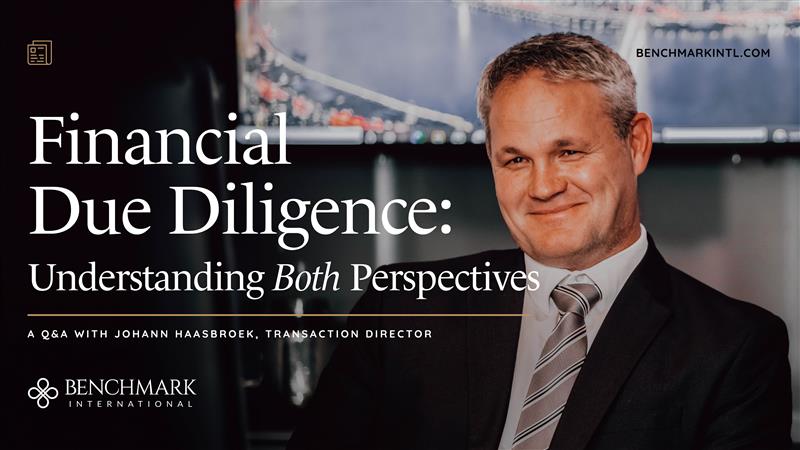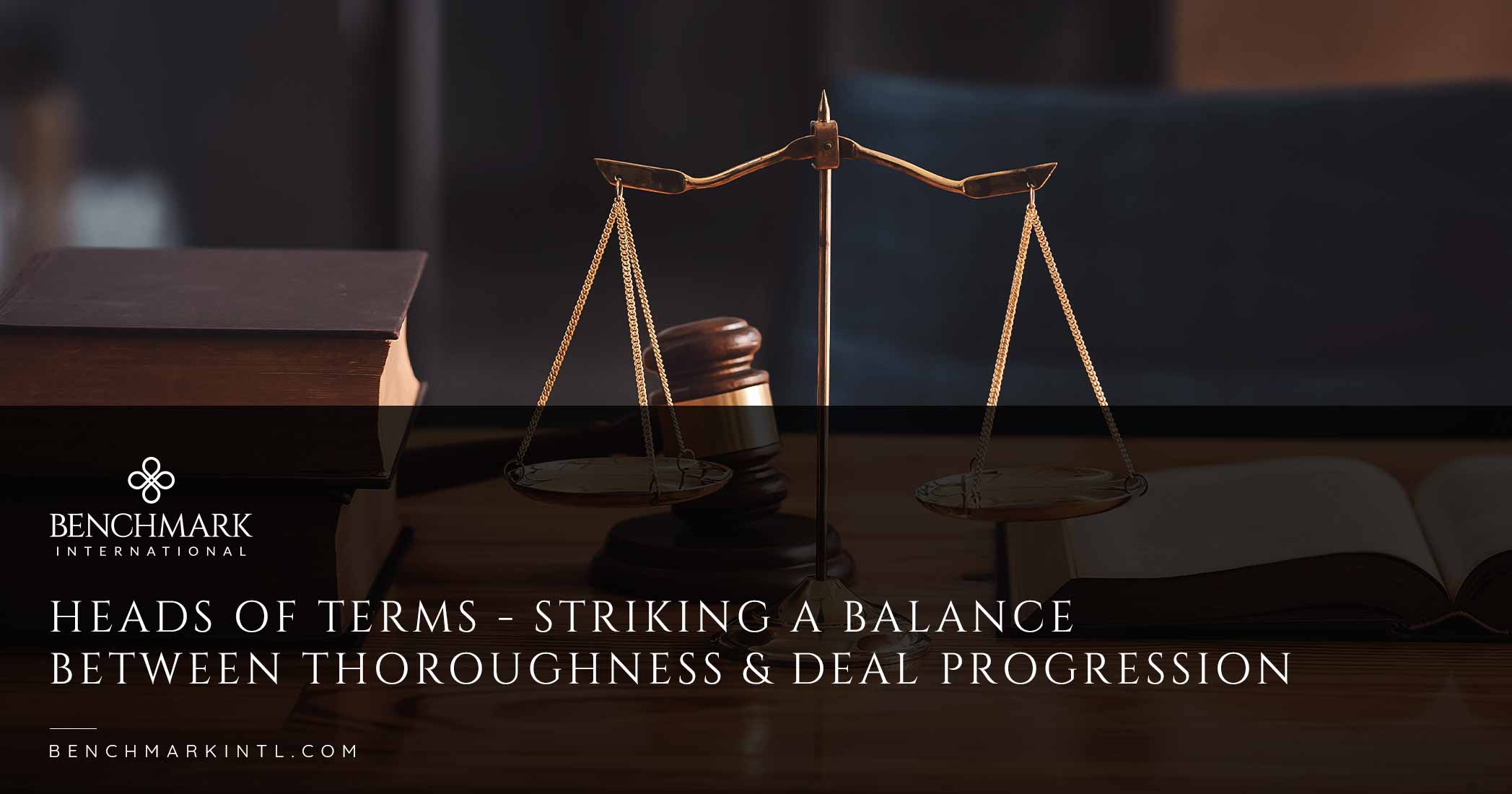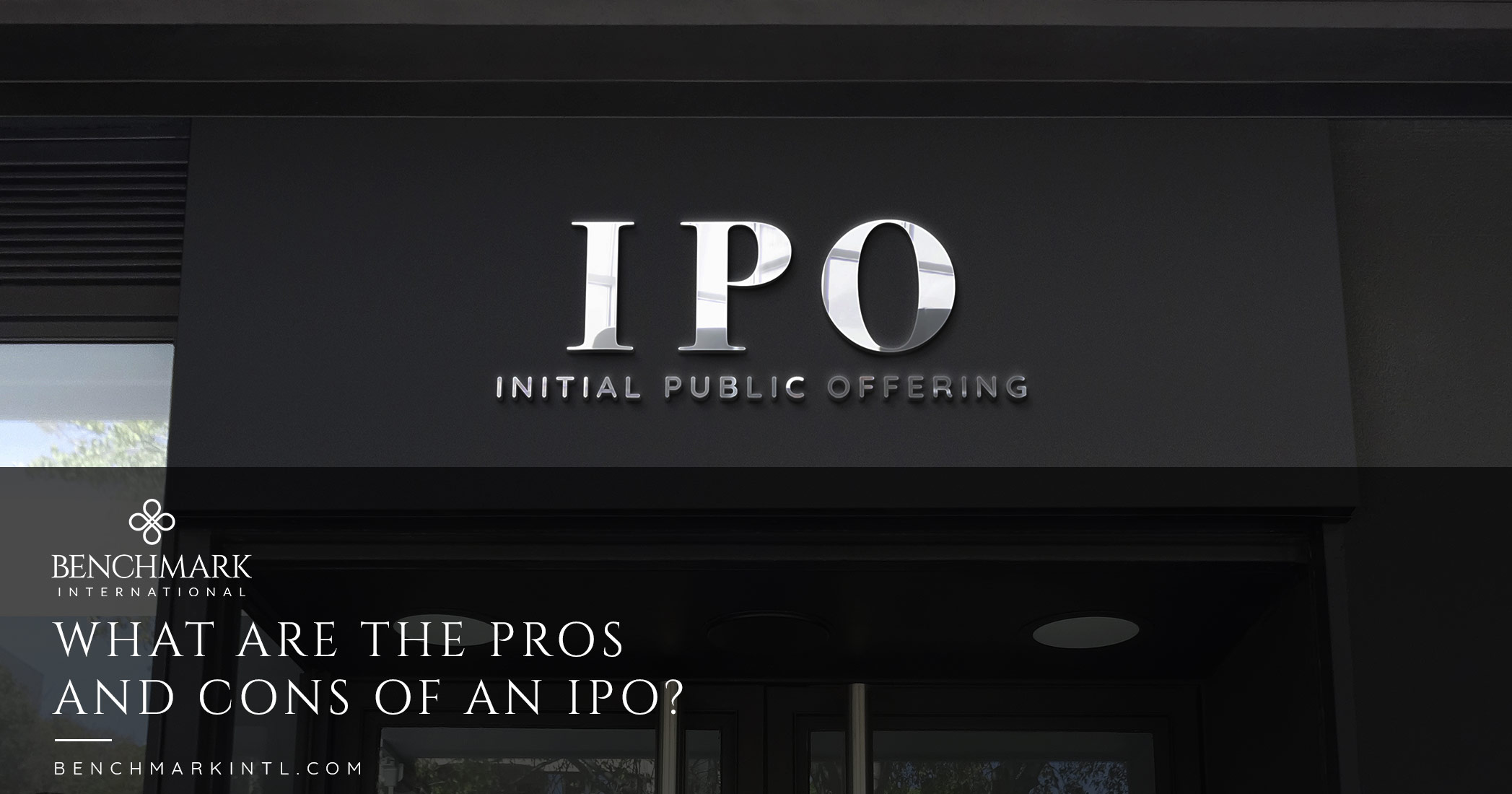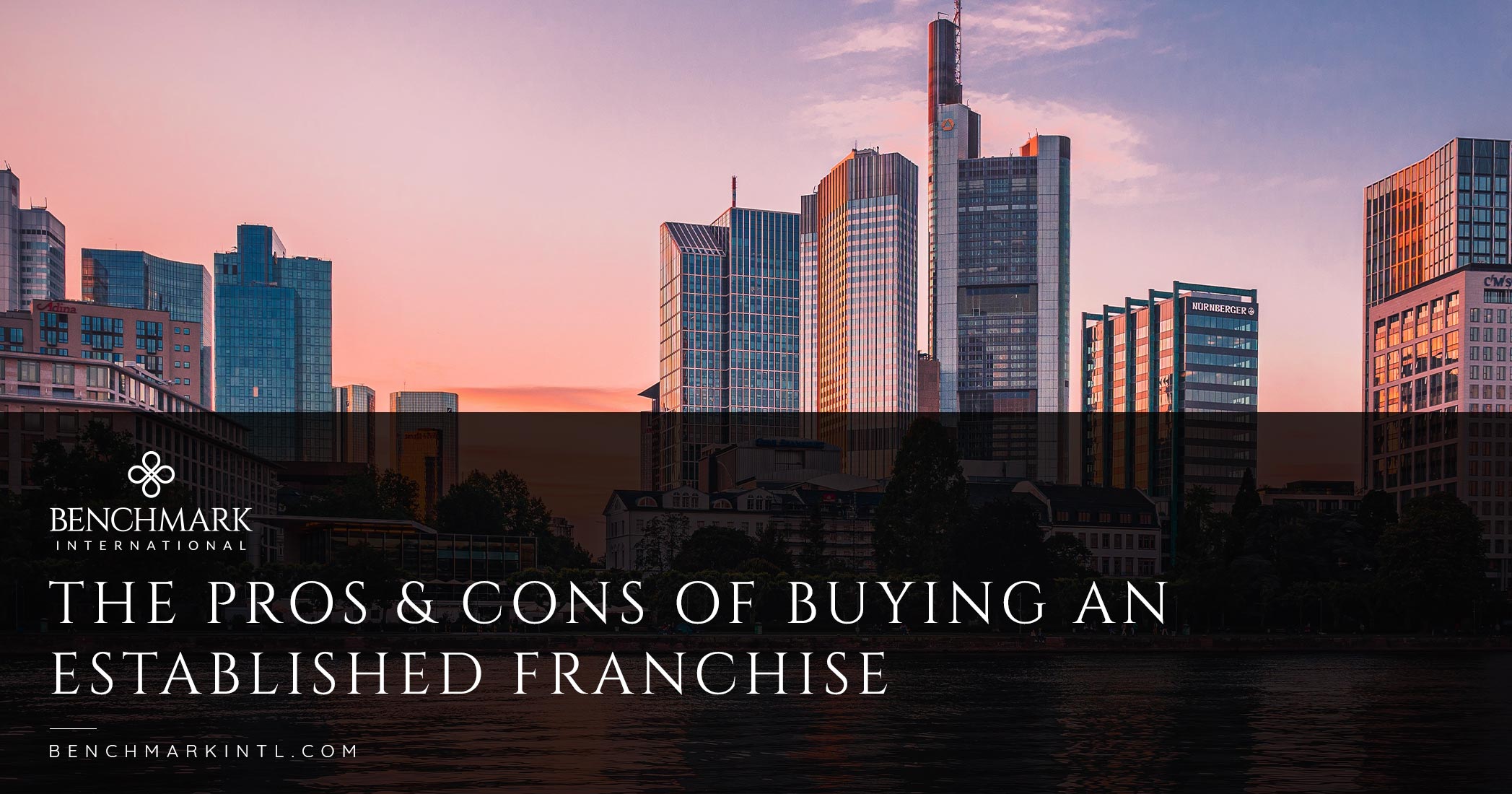James Robinson, Senior Director in our Manchester Transactions Team, has drawn from his wealth of completed deals to give a balanced view.
READ MORE >>Archives
Earn-Outs: Good or Bad for Sellers?
Financial Due Diligence: Understanding Both Perspectives
For buyers, the financial due diligence (FDD) exercise is a major fact-finding exercise that will, hopefully, reinforce the assumptions that have underpinned their offer. For sellers it’s an opportunity to showcase the business and to reinforce the opportunity to the buyer. For both, it’s a pivotal exercise for informed decision-making, providing protection from unexpected risks and uncertainties. Essentially, FDD allows both parties to complete a transaction with their eyes open.
Johann Haasbroek, Transaction director at Benchmark International South Africa, answers some of the key questions raised by seller clients.
READ MORE >>Share this:
First Impressions Matter: Preparing for the Initial Meeting with Potential Buyers
Getting ready to meet potential buyers can be a daunting task. The purpose is for you and the buyer to understand each other's businesses and explore potential fits, and it’s normally better that valuation discussions are held separately.
Here are some important considerations for that initial meeting.
READ MORE >>Share this:
Into Legals? Tips for Navigating the Final Stages
Now that you’ve signed the term sheet - Heads of Terms (Heads), or Letter of Intent (LOI) – you’re likely wondering – what’s next?
Having been involved in hundreds of mid-market transactions, Roger Forshaw – Director and fully qualified ICAEW Corporate Finance professional – highlights some recurring themes that are key to ensuring a smooth process from entering exclusivity through to completion.
READ MORE >>Share this:
Completion is Finally Close: What Now, And What Next?
After months of deliberation, organisation, conversation and negotiation, with the support of your Benchmark International team and your other trusted advisers, we are reaching the precipice of legal completion. Or simply – ‘Completion’.
After envisaging this moment for so long, you might be wondering how the day of Completion will play out, and indeed what will happen over the next few days, weeks and months. What is clear is that you are about to enter a new stage in your personal and professional life.
Samantha Tapson, Director at Benchmark International, recounts the advice she and her team share with clients at this exciting juncture.
Share this:
The Shareholder Agreement: Your Business Prenup
In the world of business, if marriage vows stand for verbal contracts, a Shareholder or Shareholders' Agreement (depending on jurisdiction) (“SA”) is the prenuptial agreement that no couple - or in this case, partners - should overlook. It’s a silent, yet formidable, guardian that ensures the romance of entrepreneurship doesn’t lead to a messy breakup. While you don’t get married anticipating divorce, marriage involves love. Business partnerships are, however, different and require an alternative expression of endearment which is best shown through signing that business prenuptial agreement/SA.
Share this:
The Crucial Documents Shaping Your Company Sale
So much hard work goes into negotiating the deal and agreeing the Heads of Terms (Heads) or Letter of Intent (LOI), it’s critical the deal is properly managed, and the legal contracts fairly negotiated to ensure the deal happens!
This article provides a summary of the key transaction documents along with insights from your experienced Benchmark International deal team.
Share this:
Skin in the Game: Navigating Post-Acquisition Stakes
The concept of "skin in the game" in the business world is not just a catchphrase; it's an ideology that defines the level of commitment and risk one has in a particular venture. Particularly in acquisitions, where future trajectories can be as diverse as they are uncertain, having a vested interest becomes paramount.
But whose interest should that be? The seller who's stepping back? Or the buyer taking charge?
Both perspectives carry merit.
READ MORE >>Share this:
Negotiate to Succeed!
Every deal negotiation is different and requires a careful understanding of the seller’s negotiating position. This can be influenced by a range of factors such as the number of buyers at the table and the respective negotiating position of each; synergies between the two parties; which buyer is in the best position to complete a deal and, of course, who is the right buyer for the business, taking into account of a range of other factors.
Martin Franz, who leads Benchmark International’s operations in Germany, shares some basic negotiating tips for business owners looking to sell their company.
READ MORE >>
Share this:
Heads of Terms – Striking a Balance Between Thoroughness and Deal Progression
So, all the hard work has paid off and you have reached a major milestone in the process – receipt of the draft Heads of Terms (‘Heads’), also referred to as the Letter of Intent or simply the term sheet. For many, this will be the first document that has a real legal look about it, although much of the content will be specifically stated to be not legally binding.
Sam McNamee, director at Benchmark International’s Irish office, explains how the Heads are designed to fulfil two primary purposes. First, to set out the key ‘heads’ of the deal, so both buyer and seller know the deal they are looking to achieve through the due diligence and legal process, and secondly, to give the buyer a legally binding period of exclusivity to have a fair run at the deal.
READ MORE >>Share this:
Your Insight, Our Expertise: Help Us Craft a Great Information Memorandum
Have you ever wished you could read minds?
At Benchmark International, our copywriters have pondered this possibility countless times. The idea of effortlessly extracting essential information from our clients' thoughts would make crafting the Information Memorandum (IM) a breeze. While we haven't quite mastered telepathy, the power of collaboration remains our greatest ally.
As industry experts, we recognise that our clients possess unparalleled knowledge about their businesses. Your insight, knowledge and experience are the driving force that propels us forward in creating a compelling IM that leaves potential buyers wanting to know more. To help you maximise your impact and contribute to the success of the IM bringing potential buyers to the table, I've compiled some valuable tips:
READ MORE >>Share this:
Cracking the Safe: Locked-Boxes Demystified
An important part of many deals is the agreement on what is referred to as Free Cash (or surplus or excess cash). In simple terms, this is the value of the cash held in the business at completion that can be added to the sale price for the seller's benefit. In the UK, we can often add this Free Cash to the overall deal value in a way that it is effectively extracted by the sellers at their marginal Capital Gains tax rate, although this requires careful tax planning and advice.
There are some related articles on this. Please see Extracting Free Cash and What Working Capital Is Not! in particular.
Share this:
How Technology is Streamlining the Deal Process
Mergers and acquisitions (M&A) have come a long way since the days of tedious paperwork and manual processes. The evolution of technology has revolutionised the M&A landscape, making the once paper-intensive process more cost-effective, streamlined, and efficient.
Share this:
Knowing Your Buyer
As well as understanding the fundamentals and financial aspects of any offer for your business, understanding ‘your buyer’ is critical to the success of the deal and your ongoing relationships post-completion. Whilst it’s not possible to know your buyer ‘warts and all’ at the start of the process, your team at Benchmark International will work with you throughout the process to build your buyer knowledge.
Step by step, we will work with you to ask the right questions at the right time, providing you with the information you need to make the all-important decision of who is the right buyer for your company, for your employees, and for you.
Share this:
What Working Capital is Not!
1 – Working Capital is Not Cash!
First and foremost, let’s be clear what working capital is not, it’s not cash! In fact, all things being equal, when working capital goes up, cash goes down, and vice versa. You'll often hear the expression, "the business needs to fund working capital for growth", when what is actually meant is that the business needs extra cash to finance the increase in working capital that accompanies growth. Businesses that try to grow without sufficient working capital are said to be 'over-trading'.
In most businesses, the basic components of working capital are stock, plus trade debtors, minus trade creditors. This working capital will have built up over time as the business has grown and, generally speaking, the longer a business has been trading, the more complex the components of working capital will have become. To explain this, we can consider a company that starts trading on Day One, wholly in cash and without holding any stock. After its first year of trading, all profits will be in the form of cash, so its balance sheet will be 100% cash, and there will be no working capital – i.e., no stock, debtors, or creditors. However, as the business starts to give credit to its customers (that become trade debtors), take credit from its suppliers (that become trade creditors), and invest in the stock, the constitution of the balance sheet will change such that its assets are cash, trade debtors and stock, and its liabilities are its trade creditors.
READ MORE >>Share this:
TRADE SALE OR SALE TO EMPLOYEES (IN THE UK)?
Introduction
There has been significant growth in the number of Employee Ownership Trusts (EOTs) in recent years, and in this article I explore some of the differences between shareholders selling to a trade buyer and selling to a trust set up for this purpose.
READ MORE >>Share this:
What Is The Denominator Effect?
When it comes to selling your business, and you are considering waiting or pausing, there are several factors to consider, such as market conditions and interest rates. But there is also something called the denominator effect.
READ MORE >>Share this:
The Public-To-Private Trend For New Paths To Growth
Many individuals at large institutions that trade in the public markets are turning to private ownership and pursuing majority equity positions in lower middle-market companies and even creating their own funds. This public-to-private trend is partially being driven by current and expected public market volatility over the next few years, combined with individual business circumstances, all with the expectation for a brighter future. The recent stock market instability is presenting attractive opportunities for companies that may perform better in the private market. Private equity and private investors have ample capital available to them at a time when public market valuations are sinking. The interest is coming from both private equity funds and strategies, as private markets are gaining ground on public markets. Take-privates are on pace for the second year in a row at $100 billion or more in deal value. That is a first for the industry in more than a decade.
READ MORE >>Share this:
Why Competition Matters
How will running a competitive bid process help me?
The lower middle market remains very active, and we anticipate that this trend will continue for the foreseeable future. If you are a business owner, you have probably received unsolicited interest and perhaps even offers for your business. There is a lot of money chasing few deals, so buyers are looking to find off-market deals to build their pipeline and purchase a business below market value to boost their investors’ returns. Having additional buyers at the table tends only to benefit the seller.
When a buyer uncovers an off-market deal, they are often in a better position to buy the business at a discounted price than what they would pay in a formal auction or open bid process. Buyers seek acquisitions to help solve a problem or hit an ROI benchmark. If the buyer can purchase a business below market, then the buyer ends up winning both in the current transaction and future transactions. The business owner is the one who tends to have seller’s remorse. Our team commonly speaks with buyers who will not participate in auction processes because they do not want to pay top dollar, and those buyers know that they are not willing to do what it takes to win the bid.
If you have ever watched an episode of Shark Tank when all the sharks are bidding on an opportunity, you have seen how a competitive bid process can benefit the company pitching to the sharks. When Lori Greiner, Barbara Coroan, Robert Herjavec, Daymond John, Kevin O'Leary, or Mark Cuban share an interest in an opportunity, it often piques the interest of another shark who wants to jump in and try to win the bid. Sometimes, the sharks even go into the deal together. This process also happens for deals within the lower middle market. When two buyers go into a deal together, they are called co-investments. In this case, two can be better than one. However, you will not know if co-investments are an option until you go to market and run a process.
When a seller receives an offer from an unsolicited party, the offer only reflects one party’s view of the value of the business. Businesses are comprised of both tangible and intangible assets. That is, the value of the business lies not only in its tangible assets like machines and inventory but, perhaps more importantly, in the quality of its people, process, customer base, and intellectual property. Acquirers buy businesses for many reasons, including for geographic expansion, product line development, talent acquisition, and competitive advantages, to name a few. Why is a business worth 5x to one buyer but 7x to another? A business's real value is the opportunities an acquirer has post-closing. Ultimately, the only way to know if the offer in hand is a representation of the market or even the best option for the business owner is to explore multiple views of the value of the business.
If you move forward with the one offer available, what will you do if the deal falls apart during due diligence? Due diligence can be a time-consuming and overwhelming process. If you go through the due diligence process and the deal is unsuccessful, what? You will not have a second or third option. The sale process can be very emotional. Often, when a deal closing is not successful, a firm that ran a bid process will typically have a handful of bidders that they are able to re-engage to work toward a successful closing. The deal team can utilize the initial data request and due diligence process to make the workload lighter the second time around. An experienced M&A deal team will be able to craft a strategy to target active buyers from previous efforts and bring them back to the table. However, if you only have one option, you must start over from the beginning. By the time you start over, you are at risk of missing the market, which might cost you tens of millions of dollars.
The other great aspect of running a bid process is that you have leverage during due diligence. Typically, when a letter of intent is signed, the negotiation power shifts from the seller to the buyer. If you have other suitors waiting in the background, an experienced M&A deal team can use that competitive tension to help a seller secure the best deal on the market and keep the buyer in check. The buyer who ultimately wins a formal auction process knows that there were other suitors competing for the bid.
It is crucial for any seller considering a sale to hire a capable sell-side M&A firm to take them to market. A dedicated sell-side team virtually assures you that you will have multiple suitors and bids. You will be able to see several different views on the value of your business and be able to determine the optimal deal structure. The process will allow you to explore other partnerships and understand what competitive advantage various firms can bring to the table. If you compare the company sale process to dating, it is good to know what other suitors offer so you can pick the best one for you! Having an experienced M&A team take you to market to uncover your best options will give you the peace of mind that you have the information you need to make the best decision for you and your business.
Author
Kendall Stafford
Managing Partner
Benchmark International
T: +1 512 347 2000
E: STAFFORD@BENCHMARKINTL.COM
READ MORE >>
Share this:
The Green Economy Update And Outlook
The global green industry is forecast to grow at a significant rate between 2022 and 2026. Over the past decade, the green economy’s market capitalization grew from $2 trillion in 2009 to more than $7 trillion in 2021. It also nearly doubled its share of the global investable market from 4% to more than 7%. Last year, the market grew at a steady rate and is expected to continue to do so with the growing adoption of strategies by key players.
READ MORE >>Share this:
The Surge Of Cryptocurrency M&A
Deal activity continues to heat up in the cryptocurrency space as the adoption of crypto becomes more mainstream. Last year was a huge year for cryptocurrencies. In 2021, the price of bitcoin was up 49%, Ether was up 390%, and Dogecoin was up a whopping 1,600%. The M&A market for cryptocurrency soared by nearly 5,000% last year. But this is nothing compared to the activity for M&A of crypto companies.
READ MORE >>Share this:
Types of Financial Buyers
There are two types of buyers: strategic buyers and financial buyers. Commercial lenders, family offices, private equity funds, mezzanine funds, independent investors, and other capital providers are all financial buyers. Strategic buyers include everything else. It can be beneficial to entertain both financial and strategic buyers when you are selling your business. Still, it is important to understand how financial buyers think and what you’re dealing with as you work through conversations and negotiations.
READ MORE >>Share this:
Why Does Ebitda Get Adjusted?
In the world of small to mid-market mergers and acquisitions, a number that is very important is a company’s adjusted EBITDA. The adjusted EBITDA is meant to find a company’s true normalized earnings by taking away any outside influences or ownership influences on the company’s bottom line. Some companies do not have to make many adjustments in order to find adjusted EBITDA, while some companies may need many adjustments to arrive at adjusted EBITDA.
READ MORE >>Share this:
Family Business Succession Planning And Success Rates
A family business is technically defined as an organization that is owned and operated by at least two members of the same family. Family businesses actually account for around two-thirds of all companies worldwide, and 90% of companies in the U.S. The largest 500 family-owned companies generate annual revenues of $6.5 trillion. Global research has also demonstrated that well-run family companies are more profitable and stay in business longer than other companies, even with the many challenges they face.
READ MORE >>Share this:
Major Investment And M&A In The Metaverse
What Is the Metaverse?
The metaverse is an immersive digital online environment that links social and commercial activities through technologies such as virtual reality and augmented reality to create 3D virtual spaces that mimic reality. Its use is quite broad and can be applied to gaming, work meetings, e-commerce, socializing, or entertainment. The term “metaverse,” which was first introduced in the 1992 novel Snow Crash, is today considered a way to truly redefine the Internet. It is a concept that is still being shaped, but the vision is rapidly evolving. There is not necessarily one single defined metaverse, as various companies are working to shape the idea in their own ways. For example, blockchain tech such as cryptocurrency and non-fungible tokens (NFTs) are being used to support digital transactions in the metaverse. Video game makers are shifting their online worlds to resemble social networks with a market opportunity to expand to include live entertainment such as concerts and sporting events. With this transformation comes a battle for the share of social media ad revenue. And as the metaverse continues to evolve, it continues to represent a huge business opportunity.
READ MORE >>Share this:
Aerospace And Defense Sector M&A Update
The financial health of the aerospace and defense (A&D) industry has rebounded significantly from the negative economic COVID-19 impacts of 2020, poising the sector for a strong M&A market in 2022. The earnings of commercial aerospace firms have recovered, and original equipment manufacturers (OEMs) have announced a series of production rate increases for the years 2023 to 2025, raising the likelihood of supply chain acquisition activity in 2022. Additionally, the defense budgets of both the United States and Europe have remained stable, leading to high demand for defense products and services despite some production offsets due to supply chain challenges.
READ MORE >>Share this:
U.S. Small Business Confidence Drops Amid Inflation Concerns
Last month, small business sentiment in the U.S. fell to its lowest level in nearly 9-1/2 years due to concerns surrounding inflation. Yet, at the same time, demand for labor remains more substantial than expected as companies continue to pursue growth.
Share this:
2022 Sector Report: Esports Valued At Over A Billion Dollars
eSports is a form of video-game-based competition that has seen significant revenue and viewership growth in recent years. Much of the revenue is coming from advertising dollars from brands, such as ads shown during live streams on online platforms, video-on-demand content of matches, or on eSports TV. And competitive gaming is becoming more mainstream than ever.
READ MORE >>Share this:
What Are Environmental, Social, And Governance (ESG) Policies And B Corp Certification?
As a business owner, you may have noticed an increase in conversations regarding environmental, social, and governance (ESG) policies in the workplace and B Corp status. Even though these policies are being implemented more frequently with larger companies, many small and mid-size business owners are not fully aware of what these policies are, what they mean, and how they are affecting investor behavior and M&A transactions. Let’s start by breaking down exactly what ESG is.
READ MORE >>Share this:
What Are The Pros And Cons Of An IPO?
An IPO is an initial public offering (IPO), which is the first limited public stock sale by a private company. IPOs are a strategy often used by smaller businesses to raise capital from public investors in order to facilitate expansion and growth. Once public, the company can be traded on the open market. There are both upsides and downsides to taking a company public.
READ MORE >>Share this:
The M&A Process From A Buyer’s Perspective
When it comes to mergers and acquisitions, it is common for a seller to struggle to see the transaction from a buyer’s point of view. This is quite understandable because a business owner spends years, and even decades, building their company into a successful venture. It makes it more difficult to see the transaction from a potential buyer’s perspective. Many M&A transactions fall through because the seller and buyer simply cannot get on the same page. As a seller, you can work with an experienced M&A advisor to help you manage your expectations for the value of your company so that you can not only get the most out of your deal but also make sure the deal goes through. If you’re selling a business, you should understand how the valuation of a company works, what it is based on, and what is important to a buyer.
READ MORE >>Share this:
2022 Digital Healthcare Industry Report
Share this:
Benchmark International Named Best Middle Market M&a Specialists
Benchmark International has been named the Best Middle Market M&A Specialists by Corporate Vision’s Corporate Excellence Awards.
READ MORE >>Share this:
The Pros & Cons Of Buying An Established Franchise
Share this:
2022 Real Estate Industry Report
Share this:
The New Reality and What it Means for Valuation
Is the bull market for privately held companies over? No, that’s not (yet) the reality. But one of the hallmarks of the glorious decade for selling businesses is no more. And unfortunately, many of the acquirers’ gatekeepers weren’t around the last time there was a bull market that looked like this one.
So what is this new normal? Let’s first look at the old normal that we enjoyed from 2010 to 2019 - a nice, slow, smooth macroeconomic recovery. The normalcy of the “teens” allowed small and medium businesses to grow smoothly under ideal conditions. As a result, many businesses experienced near-constant year-over-year growth. And when they’ve failed to do so (or failed to do better), the reasons for the deviation could almost always legitimately be traced directly to some internal event; perhaps the loss of a key salesperson, the launch of a bad enhancement, the lack of ability to pass on an increase in inputs to the customer, or the inability to keep up with a specific competitor.
READ MORE >>Share this:
How to Avoid Seller's Remorse
Selling your business can be an emotional experience. You certainly don’t want to be left at the end of the process with a sinking feeling that you have made a bad deal or sold to a buyer who doesn’t appreciate the value and legacy of the company you have built. However, there are things that you can do to avoid seller’s remorse; we will discuss several of them in this article for you to consider.
It’s best to begin putting together an exit plan sooner rather than later. Preparing well for the transition of a business requires time, action, and significant attention. For many business owners, their business represents the majority of their wealth. Planning for the transition allows you to have enough time to minimize taxes, prepare financially for a living situation without the income from the business and put a plan together for the next phase of life. Although typically, entrepreneurs are not the retiring type, knowing what your next move will be can be very important for your state of mind post-sale. Seller’s remorse can often be avoided by beginning to plan for the transaction three to five years before the business owner wants to exit.
Share this:
Questions to Ask Before Selling Your Company
What’s Your Competitive Advantage on the Market?
Consider why prospective buyers would be interested in purchasing your company. You should be able to identify its assets in order to get a proper business valuation. How unique is your product or service offering? Do you outperform the competitors in your sector or in a particular geographic area? You will also want to consider whether your revenues are stable, growing, or declining. If you understand why someone would be interested in purchasing your company, you will be more equipped to enhance those qualities and effectively articulate them to buyers.
READ MORE >>Share this:
Dispelling Myths about Private Equity Buyers
We have all heard the horror stories from lower middle market business owners. Private Equity buyers will come in and get rid of all of my employees, borrow an absurd amount of money to finance the acquisition, thereby straining my company’s balance sheet and income statement, and then, light a match Goodfellas-style when they are done extracting value from it. But, I’ll let you in on a little secret? The days of financially engineering a path to outsized profits are long gone. While there certainly was an era where Private Equity funds looked to lock in a guaranteed “win” by over-levering the balance sheet, stripping the Income Statement of “fat”- read, people- and quickly flipping to monetize the win, those days are largely behind us. Today, most professional buyers value the team in place more so than any perceived competitive advantage with the product or service offering. I’ll say that again, buyers often view the team as the most important determinant of success- more so even than the core product or service offered by the business.
READ MORE >>Share this:
Strategies for Retaining Talent During a Merger or Acquisition
Mergers and acquisitions are effective solutions for growing a company, getting a competitive edge, accessing new resources, lowering risk, tapping into new markets, and acquiring key talent. Obviously, these are all very appealing to investors and upper management. But employees do not always see it this way.
In actuality, employees often view such a major change as a threat. These negative feelings can lead to employee retention problems, especially in today’s world where labor shortages are already a significant problem. Staff members may feel uncertain about the future of the company, how secure their job may be, how the culture will change, and how a change in leadership will impact them. They can also have their concerns worsened or blown out of proportion if there is not a clear line of communication about what is happening with the company during a transition. Sometimes employees will feel a sense of betrayal. Furthermore, some team members may feel guilty if they keep their jobs while coworkers are victims of downsizing or restructuring. Combine all these factors and quickly end up with people looking for work elsewhere. But that is not good for any deal. Why?
READ MORE >> Benchmark International
Benchmark International  Benchmark International
Benchmark International 








































